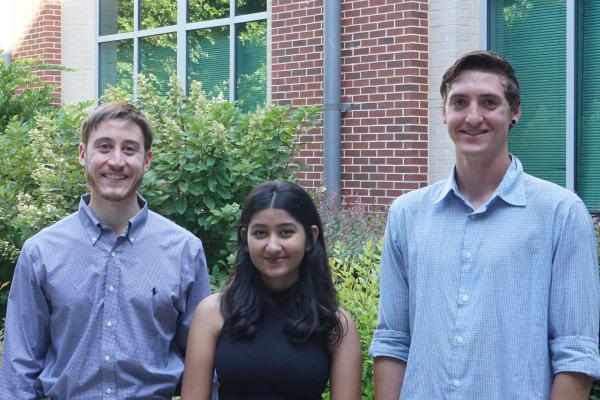Congratulations to Joshua Lewis (Ph.D.), George Gruenhagen (M.S.), and Prerna Jain (M.S.) who were recognized as the 2019 Outstanding Students in Bioinformatics at Georgia Tech. Each student received a monetary award funded by the J. Leland Jackson Endowed Fellowships Fund in Bioinformatics. Students were selected for demonstrated excellence in their academic studies and their bioinformatics research.
Our 2019 Outstanding Ph.D. Bioinformatics Student is Joshua Lewis. As an M.D./Ph.D. student at Emory University’s School of Medicine and Georgia Tech’s Bioinformatics Graduate Program, Lewis is training to become a physician-scientist who will help improve patient care by bridging the gap between biomedical informatics and clinical practice. Lewis is advised by Melissa Kemp, associate professor, in the Wallace H. Coulter Department of Biomedical Engineering.
Lewis’s research is both increasing our understanding of the biological mechanisms of radiation resistance, as well as contributing towards novel bioinformatics approaches for improving the personalized diagnosis and treatment of cancer patients. Kemp says, “Josh epitomizes the independent thinking we strive for our bioinformatics Ph.D. students to develop. He has single-handedly driven numerous external collaborations through his analytical pipeline development.”
Lewis has been recognized with two previous prestigious fellowships: 1.) the NIH T32 training program in Computational Biology and Biomedical Genomics; and 2.) the NIH F30 pre-doctoral NRSA fellowship. To date, Lewis has two first author publications in top journals in the fields of redox biology and radiation oncology, and two additional publications as a contributing author. In addition, he has given three oral presentations and three poster presentations on his research at both national and international conferences in the fields of cancer systems biology and redox biology.
Lewis has mentored three undergraduate students and one master’s student in Kemp’s lab, providing them with guidance on their research projects and facilitating their development into independent researchers.
This success has been achieved while maintaining his clinical requirements as a medical student at Emory University, including physician shadowing and case presentations at clinical conferences.
George Gruenhagen, one of our two 2019 Outstanding M.S. Bioinformatics Students, works on an NIH-funded tooth development and regeneration project. His contribution to a computational analysis of genome sequences from species with divergent tooth shapes will result in authorship on a manuscript. Gruenhagen works with Professor Todd Streelman in the School of Biological Sciences.
Gruenhagen is involved in project planning for the next four-year stage of this work. The goals are to identify and sequence single cells (or single nuclei) from stem cell populations in mouse incisors, cichlid teeth and zebrafish teeth. He will work with scientists in the Streelman Lab, in Kings College London, and at Harvard Medical School to set the analytical pipeline for comparative analysis of single cell RNA-seq data.
This summer, Gruenhagen worked at the NCBI on discovering conditional driver mutations in over 30 cancer types. His approach to characterize conditional drivers in cancer is more statistically robust than previous approaches that simply rely on presence/absence of conditional mutations in cancers. Through this experience, he has contributed to advancing the field of driver mutation detection.
Our second 2019 Outstanding M.S. Bioinformatics Student is Prerna Jain, who works with Sam Brown, associate professor, in the School of Biological Sciences. According to Brown, “In four years of supervising GT Bio-informatics M.Sc. students, she is the most promising student I have mentored. Prerna has become a key contributor to our lab. Prerna’s project goal is to unravel the genetics of antibiotic resistance in the notorious opportunistic pathogen Pseudomonas aeruginosa, via a comparative genomic approach. In light of her substantial impact on this project, Prerna is in position to be first author on a significant paper.”
This summer, Jain worked as an informatics intern at Intellia Therapeutics, where she developed a custom pooled CRISPR screen analysis pipeline and benchmarked it successfully using simulated, in-house, and public datasets. Her second project was to help build a hierarchical machine learning classifier to perform cell typing from scRNAseq data for Peripheral Blood Mononucelar Cells. Jain successfully benchmarked her approach against those available in literature and was able to achieve a significant improvement (~200%) in classification accuracy for CD4+ cells (their cells of interest).
Outside of her research, Jain is involved in the graduate community at Georgia Tech by serving as a graduate peer career advisor.
Media Contact
Lisa Redding, Academic Program Coordinator (lisa.redding@biosci.gatech.edu)
Keywords
Latest BME News
Jo honored for his impact on science and mentorship
The department rises to the top in biomedical engineering programs for undergraduate education.
Commercialization program in Coulter BME announces project teams who will receive support to get their research to market.
Courses in the Wallace H. Coulter Department of Biomedical Engineering are being reformatted to incorporate AI and machine learning so students are prepared for a data-driven biotech sector.
Influenced by her mother's journey in engineering, Sriya Surapaneni hopes to inspire other young women in the field.
Coulter BME Professor Earns Tenure, Eyes Future of Innovation in Health and Medicine
The grant will fund the development of cutting-edge technology that could detect colorectal cancer through a simple breath test
The surgical support device landed Coulter BME its 4th consecutive win for the College of Engineering competition.








